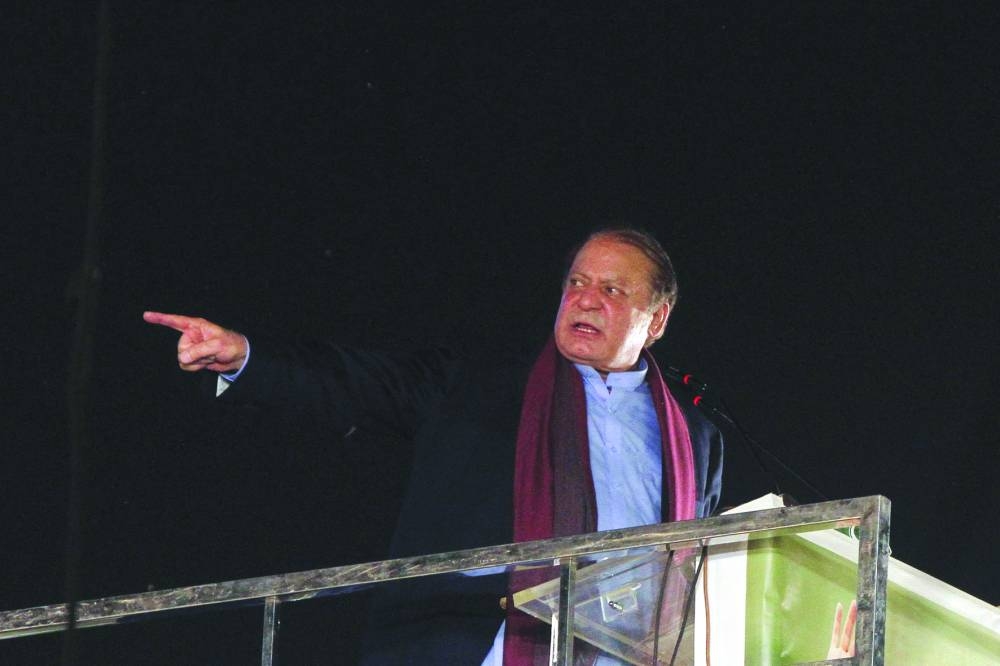Three-time Pakistan prime minister Nawaz Sharif ended four years of self-imposed exile yesterday, launching his political comeback at a rally attended by thousands of rapturous supporters ahead of elections due next year.
Fireworks marked his arrival at the event in a park in his power base of Lahore, where the streets have been shrouded in green and yellow party banners.
Pakistan is facing overlapping security, economic and political crises ahead of polls pushed back to January 2024, with Sharif’s major opponent, the fiercely popular Imran Khan, languishing in jail.
“I am meeting you after a long time, but my love for you remains intact. You have never betrayed me and I have never betrayed you,” Sharif told the crowds, wearing his signature red scarf.
His speech focused on the need to tame runaway inflation and for national unity – in an apparent swipe at Khan, whose campaign for re-election has targeted military generals as well as the judiciary.
“I want to serve this nation,” said the 73-year-old veteran politician in his address to his supporters in Lahore.
“My only desire is to see this nation prosper,” he said after he compared today’s essential goods prices with his last tenure before he was ousted in 2017.
Sharif promised to work toward economic recovery, without laying any plans, saying: “We will control inflation.”
“Things have worsened to the extent that people have to choose either to pay their electricity bills or feed their kids,” he said. “It has become impossible for people to pay bills. People are committing suicide.”
“There is no room for mistakes,” he stressed. “We need to start a new journey.”
Sharif – who founded the Pakistan Muslim League – Nawaz (PML-N) party – was serving a prison sentence for graft when he left the country in 2018 seeking medical care in Britain, subsequently ignoring multiple court orders to return.
His conviction remains in force, but on Thursday a court barred authorities from arresting him until Tuesday, when he is to appear in court.
While he cannot run for or hold public office because of his convictions, his legal team says he plans to appeal and his party says he aims to become prime minister for a fourth time.
The “Lion of Punjab” touched down briefly in Islamabad, where he signed court papers, before flying on to Lahore and taking a helicopter to the Greater Iqbal Park, where he addressed supporters.
More than 7,000 police were enlisted to control crowds, according to a senior officer on site.
“I’m here to welcome my leader. The inflation is very high and poor people are desperate,” said 18-year-old Razi Ullah. “God has given him a chance to come back and turn things around. He’s done it before.”
Sharif’s return has been touted for months by his party, which hopes his political clout and “man of the soil” swagger will revive its flagging popularity.
Sharif has been prime minister three times but has never completed a full term.
His political fortunes rise and fall on his relationship with Pakistan’s military establishment – the country’s true kingmakers who have ruled directly for more than half of its history and continue to enjoy immense power.
His last term ended when he was ousted in 2017 and given a lifetime disqualification from politics after being convicted of corruption in a case he says was politically motivated.
Khan then stormed to power backed by young voters – and, analysts say, the military.
Months later, Sharif got permission to seek medical care in Britain.
He is widely believed to have continued pulling the strings of his party from a luxury property in London.
His fortunes changed when Khan had a spectacular falling out with the top brass.
The former cricketing superstar was later jailed over several cases he said are designed to keep him from contesting elections.
Nawaz Sharif’s younger brother Shehbaz, who enjoys a closer relationship with the military than Nawaz, came to power in a coalition that ousted Khan.
Shehbaz’s government oversaw a change to the law limiting the disqualification of lawmakers from contesting elections to five years – paving the way for his return.
Legal hurdles blocking Sharif from power are likely being removed as part of a backroom deal between his party and the army, said analyst Zahid Hussain.
“There was some sort of arrangement with the military establishment; without that, he wouldn’t have decided to come back,” he told AFP.
The military denies that it interferes in politics.
“An evergreen rule about Pakistani politics is that your chances of taking power are always greater when you’re in the good books of the army,” said Michael Kugelman, director of the South Asia Institute at the Wilson Centre. “Over his long political career, Sharif’s relationship with the military brass has blown hot and cold. It’s now in a relatively cordial phase, and he stands to benefit politically.”
Shehbaz Sharif’s short reign in power coincided with a stint of runaway inflation and a currency reserve crisis that brought the nation to the brink of default – denting the party’s credibility.
“Sharif’s key challenge is first to establish himself and his party as viable options to replace Imran Khan, who is already popular, and secondly to turn around the economy,” said political analyst Ayesha Siddiqa.

Nawaz Sharif gestures upon his arrival in Lahore.
